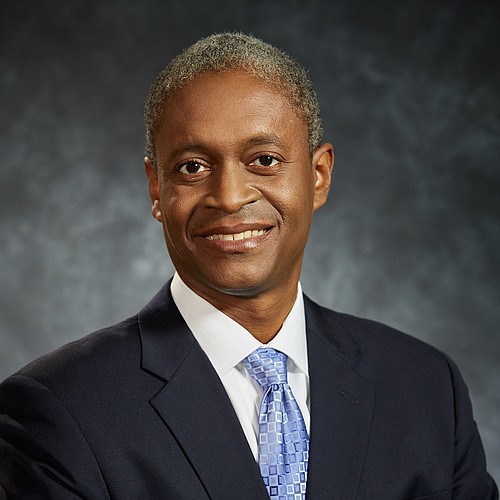
The U.S. economy appears to be on track, with employment and inflation meeting the objectives of policymakers, Federal Reserve Bank of Atlanta President Raphael Bostic said Wednesday.
However, business people are telling him they are concerned about uncertain trade policies, Bostic said during a luncheon talk to the World Affairs Council of Jacksonville at the River Club Downtown.
“Swelling optimism over tax policy at the beginning of the year has now been replaced almost completely by uncertainty regarding the proposed tariffs and the possibility of a trade war,” he said.
Bostic, who has been at the Atlanta Fed for nearly a year, is one of 12 voting members of the Federal Open Market Committee, the arm of the Federal Reserve that sets the direction of U.S. interest rates.
The FOMC comprises the seven governors of the Federal Reserve Board and five of the 12 presidents of the regional Fed banks on a rotating basis. Bostic became a voting member this year.
Bostic said the FOMC’s mandate from Congress is to set interest rate policies that promote high employment and price stability.
The U.S. unemployment rate is at its lowest level since December 2000 and inflation, as measured by the Personal Consumption Expenditures price index, is at 2 percent, the level the Fed has targeted for a stable price environment, he said.
“Although I think we’re on track in satisfying our dual mandate, this doesn’t mean we can hang up our hats and head home,” Bostic said.
“There is still work to do, and risks on the horizon need to be monitored.”
Bostic said one area to watch is consumer and business spending in the wake of tax reform that lowered federal income tax rates this year.
“I have received few, if any, reports of a noticeable acceleration in consumer spending attributable to the tax cuts,” he said.
He also is not seeing evidence that businesses are using their tax savings to increase investment.
“The latest indicators on durable goods orders and shipments suggest a marked slowdown in investment spending on equipment going into the current quarter,” he said.
“While this is one month, and the monthly data on factory orders tend to be rather volatile, it is concerning given that the recent tax cut legislation should be providing some stimulus to investment spending.”
Bostic thinks uncertainty about long-term trade policies may explain that.
“I have gathered little indication that firms are pulling back on investment projects that are already in progress,” he said.
“But investment projects slated for the pipeline have been pushed out, in some instances for many years.”
While Bostic is noticing the impact of uncertainty, he did not advocate a specific strategy for trade.
“Indeed, trade policy is never as clear-cut as most of us would hope,” he said.
The World Affairs Council of Jacksonville, a nonprofit and nonpartisan organization that promotes understanding of global issues, announced a new partnership with the Atlanta Fed during Wednesday’s meeting at The River Club Downtown.
Under the partnership, the council will hold events once a year featuring speakers from the Fed that will sometimes include Bostic but also bring in other officials.